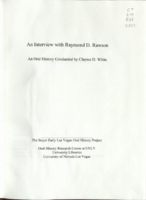Search the Special Collections and Archives Portal
Search Results

Transcript of interviews with Al Levy by Cheryl Caples, February 23, 1979 and by Martha Zehnder, March 8, 1981
Date
Archival Collection
Description
Part I: Interview with Al Levy by Cheryl Caples on February 23, 1979. At the time of this interview, Levy was serving on the city commission (now the Las Vegas City Council). He talks about growing up in Las Vegas and attending Las Vegas Grammar School (Fifth Street School) and Las Vegas High School. He mentions the Helldorado events, recreational activities, and raising a family in Las Vegas. Part II: Interview with Al Levy by Martha Zehnder on March 8, 1981. Levy recalls much of the same information as the previous interview, and again talks about his schooling and attending the University of Southern California. He returned to Las Vegas to assist his father with his grocery stores. Levy talks about the polio epidemic as the reason that children were not allowed to swim at public or hotel pools. He discusses his real estate firm, Levy Realty Company, his involvement in the community and the Jaycees (Junior Chamber of Commerce), and the booming hotel industry. Levy also discusses some city leaders he's known, including Mayor Gragson. He talks about his Jewish faith and having to go to Los Angeles to train for his bar mitzvah because there were no rabbis living in Las Vegas.
Text

Transcript of roundtable interview with the Holocaust Resource Center: Myra Berkovits, Susan Dubin and Doug Unger, by Barbara Tabach, September 4, 2014
Date
Archival Collection
Description
Interview with Myra Berkovits, Susan Dubin and Doug Unger of the Holocaust Resource Center. In this interview, the group discusses the beginnings of what is now the Sperling Kronberg Mack Holocaust Resource Center. Edythe Katz-Yarchever is discussed as the catalyst for establishing the center and getting others involved with the Governor's Advisory Council on Education Relating to the Holocaust. Berkovits talks about her role as a liason for Holocaust education in the Clark County School District and the student-teacher conferences held each year with funding from Sheldon Adelson. Unger discusses expanding the outreach to the Washoe County School District with assistance from Atlantis Hotel (Reno, Nev.) owner, John Farahi and Judy Mack. They talk about the previous locations of the Holocaust Resource Center on Maryland Parkway, then Renaissance Drive, and the affiliation with the Jewish Federation and the Jewish Family Service Agency. After funding and personnel issues around 2011, the advisory council and the library went through a re-structuring and hired Susan Dubin who organized and catalogued the library collection. The library is now accredited by the Association of Jewish Libraries.
Text

Transcript of interview with Andrew and Debbie Levy by Barbara Tabach, September 12, 2016
Date
Archival Collection
Description
Andrew (Drew) Levy was born and raised in Las Vegas, Nevada, where his family became prominent civic and real estate leaders. His grandfather was Harry Levy, a former Las Vegas City Commissioner, and his father Alvin Levy was a former councilman. Drew is always proud to say that he never left Las Vegas and of partnering with his father in the Levy Realty Company. While growing up, Drew it was easy for a teenager to enjoy the perks that could accompany his family?s civic persona?such as casino shows, events and meeting early Las Vegas casino executives like Moe Dalitz. After graduation from Clark High School, Drew attended Arizona State University. It was in Tempe that he met Debbie Cheek, his future wife. When Debbie arrived in Las Vegas, she enrolled at the University of Nevada, Las Vegas, where she finished her degree and started her accounting practice. She ran her business for ten years before opening Art Starts Here, an art school. In the 1990s, Debbie?s passion for art led her to be involved in the creation of First Friday, a local monthly art festival. She also teaches a summer art camp for the Adelson Educational Campus. Drew and Debbie became deeply involved in the many Jewish congregations in Las Vegas. Blossoming first at Temple Beth Sholom where they were married in 1980, Debbie sat on the preschool board and oversaw the temple board, while Drew was the advisor for the youth group. The couple later joined Congregation Ner Tamid where Drew was congregation president from 1999 to 2000 and Debbie was board treasurer in 2001. Debbie includes stories of her conversion to Judaism and keeping kosher. In this interview, Drew and Debbie Levy reflect on changes they see in Las Vegas, from when Drew was a kid to the times they raised their own daughters, Sarah and Jenna, here. Looking at the larger picture of the city, they describe booms in the real estate market and growth in the artistic and cultural aspects of Las Vegas. They provide a perspective of the growth of the local Jewish community.
Text

Transcript of interview with Steven Eisen by Barbara Tabach, September 14, 2016
Date
Archival Collection
Description
Steven Eisen (1966 - ) is the oldest son of Barry and Beverly Eisen, who were part of the migration of Jews from St. Louis to Las Vegas in the 1960s. He is married to Stacy Fisher and the older brother to Andrew and Robert Eisen. They are members of an early group of born-and-raised Las Vegans. Growing up Jewish, he became a bar mitzvah, belonged to B?nai B?rith Youth Organization. In this oral history interview, Steve recalls enjoyable stories of growing up in Las Vegas and humorous anecdotes of mistaken identity since the three brothers bear such strong physical resemblances. Today he finds himself enjoying his career as CEO of the Children?s Heart Center since 2001 and talks about the success and reputation of the pediatric medical group. It was his first job as a fourteen year old helping Theodore Manos and Michael Cherry during the MGM fire litigations where he learned about the legal world and being organized as a path to success in whatever he might pursue. Steve graduated from University of Missouri, attended law school at Washington University in St. Louis, and received his business degree from UNLV. Throughout the interview, he recalls the steady and strong involvement of his parents in their sons? educations. He also describes their active connection with the Jewish community and organizations. Steve?s wife Stacy is a professor in physical therapy at Touro University.
Text

Transcript of interview with John Boyle by Meghan Boyle, March 14, 1981
Date
Archival Collection
Description
Text

Transcript of interview with Rowena Gonzalez by Michael Boyd, March 1, 1977
Date
Archival Collection
Description
On March 1, 1977, Michael Boyd interviewed Rowena Gonzalez (born 1946 in Wichita Falls, Texas) about her life in Nevada. Gonzalez first talks about her family background and residential history before discussing the way of life in Texas and eventually in Las Vegas. Several topics covered in the interview include Gonzalez’s recollections of the atomic testing, the building of the Hoover Dam, and Howard Hughes. The two also discuss tourism, the properties on the Strip and in Downtown Las Vegas, and early means of transportation.
Text

Transcript of interview with Ethel S. Hatch by P. Kohlman, November 24, 1975
Date
Archival Collection
Description
On November 24, 1975, collector P. Kohlman interviewed housewife, Ethel S. Hatch (born April 11th, 1914 in Valentine, Texas) in her home in Las Vegas, Nevada. This interview covers the history of Las Vegas from 1939 to 1975. Mrs. Hatch also talks about ranching in Nevada, Rex Bell, development on the Strip, the first hotels, and early local shopping culture. She refers to Block Sixteen as Block Thirteen when discussing the Red Light District. The interview concludes with discussion surrounding tree-lined streets, the Helldorado Club, and Fremont Street.
Text

Transcript of interview with Murl Emery by James M. Greene, October 18, 1974
Date
Archival Collection
Description
On October 18, 1974, James M. Greene interviewed Murl Emery (born June 7th, 1903 in Bolton, California) at his home in Nelson, Nevada. Also present during the interview is Mrs. Emery and Mr. Dutch Eckhart, a guest who has just arrived to visit with Mr. Emery. The interview covers Mr. Emery’s personal experience in and around Southern Nevada, particularly in the areas from Searchlight, Nevada to Nelson, to Boulder Canyon, but mostly on the Colorado River. Mr. Eckhart also helps to interject some insight into the popularity of the Model T Ford in those days and early days of newly paved roads. Additionally, they discuss water shortage, wells, the building of the railroad, and mining in Nevada. Mr. Emery also discusses the books that were written about his adventurous life, his discoveries and his explorations.
Text

Transcript of interview with Stella Fleming by Suzanne Wright, February 24, 1979
Date
Archival Collection
Description
On February 24, 1979, Suzanne Wright interviewed Stella Fleming (born December 1, 1897 in Victoria, Canada) about her experiences as a Las Vegas, Nevada resident and as a worker in the welfare department in Clark County. Fleming first talks about some of her work in welfare and specifically the early practices of the welfare administration. She also discusses her work as it related to the Works Progress Administration, the American Red Cross, and the Nevada Emergency Relief Program. Fleming also provided some anecdotes about her experiences in that field before moving on to discuss some of the historical aspects of Las Vegas, such as the atomic testing, specific landmarks and locations, and the development of the city.
Text

Transcript of interview with Dr. Ray and Linda Rawson by Claytee White, October 30, 2009 and November 13, 2009
Date
Archival Collection
Description
Raymond Rawson's life started in the rural Utah community of Sandy in 1940. His family moved around in what he describes as a scene from John Steinbeck's The Grapes of Wrath. By the age of 10, the family settled in Las Vegas, which had a population of around 35,000. He attended Fifth Street Grammar School, Las Vegas High School, was a member of UNLV's first graduating class, and eventually became a dentist. In this interview, he reflects on his experiences of growing up in Las Vegas, the hardships of difficult economic eras, and his professional accomplishments in the field of dentistry, including actively advocating the creation of UNLV School of Dental Medicine. Ray also became a community leader. He served in the Nevada State Legislature from 1985 to 2001. He talks about his relationship with long-time legislator Joe Neal. Education and access to healthcare were among the issues that Ray championed and he shares his observations of these issues. In 2009, he was appointe
Text
